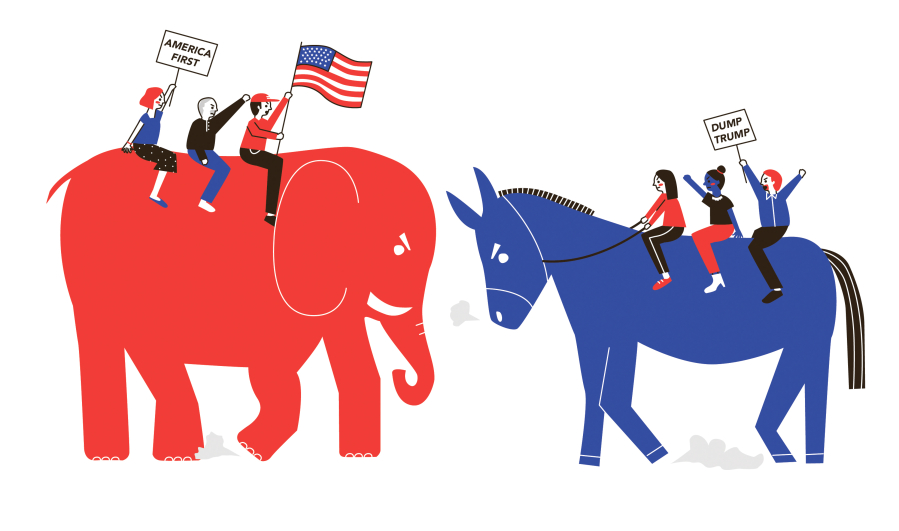Although Clark County had the third worst voter turnout in the state in November’s election, Jim Mains, a local political consultant, said he thinks next year will be different.
“I think people, no matter where you land politically, are tired of things not getting done,” he said. In the coming year, he predicts, people will realize that if they want change, they’ll need to step up.
Next year, there will be plenty to step up to. Rapidly growing Clark County is still struggling with housing and land-use issues. In 2018, Clark County voters will decide races for state Legislature and county council, as well as whether Congresswoman Jaime Herrera Beutler, R-Battle Ground, will keep her seat.
Meanwhile, some newly formed citizen groups could see their first victories, while others continue ongoing battles.
“I think you are going to see a lot of engagement in this coming year from numerous tribes,” said Mains.
Here is a field guide to some of those tribes.
The Democrats
Rich Rogers, chair of the Clark County Democrats, is optimistic about his party’s prospects given the results of the 2017 election, where voters decided races for various city council and school board seats, as well as the contentious Port of Vancouver commissioner race.
Although these races are nonpartisan, Rogers said many candidates the party recommended and campaigned for prevailed. In particular, he pointed to Don Orange, who won the Port of Vancouver commissioner race on an environmental platform despite being significantly outspent.
“Don Orange is a great victory for Democrats,” he said.
Rogers said that his party intends to announce candidates for county council in January. He said the party will make an issue of the council abruptly terminating County Manager Mark McCauley, who was well-liked by county staff.
“They’ve really accomplished nothing of any value,” Rogers said of the council, which is entirely made up of Republicans except for council Chair Marc Boldt, an independent.
Rogers said the race for the District 2 seat, which is currently held by Councilor Julie Olson, will be more difficult. But, he said, the party sees a particular opportunity for Councilor Jeanne Stewart’s seat. Stewart, who has yet to announce if she’ll run for reelection, was elected to the council on a countywide vote in 2014. Since then, the county has implemented a home rule charter, which means Stewart now represents the most urban district and answers to a more liberal constituency.
“I think that Jaime Herrera Beutler is at the top of the list for vulnerable candidates,” Rogers said.
Although Herrera Beutler voted against an attempt to repeal the Affordable Care Act, Rogers said she has supported the agenda of President Donald Trump, who lost Clark County in 2016 by fewer than 500 votes. He also faulted her recent vote in favor of a tax reform bill that critics say is tilted toward the wealthy. Herrera Beutler has defended her vote, saying that the average family of four will keep $2,385 more of their earnings annually.
So far, four Democrats are running against Herrera Beutler, including Carolyn Long, David McDevitt, Dorothy Gasque and Peter Harrison.
The Republicans
David Robert Gellatly, the chair of the Clark County Republican Party, is also optimistic about 2018.
In October, Gellatly emerged victorious from GOP infighting after the party’s precinct committee officers voted to remove three members from its governing board. Earlier, Gellatly had been subject to a failed no-confidence vote and had been attacked over his leadership and handling of party finances.
With the drama over, Gellatly said he expects the party to have a clearer direction and that there will be more opportunities for involvement. He said the party now has seven committees that will make better use of volunteers and resources.
“I think with the structure we have now, it will be different as far as the support we are able to offer,” he said.
Gellatly acknowledged that while the president’s party is usually at a disadvantage in midterm elections, he’s still optimistic about Herrera Beutler. He said her vote for the tax bill will end up being a positive.
“There is a lot of excitement in what could happen in 2018 with the new tax bill and the economy,” he said.
Candidates backed by Clark County GOP in 2017, including Port of Vancouver Commissioner candidate Kris Greene, Vancouver City Council candidate Justin Forsman, Washougal mayoral candidate Dan Coursey and Vancouver mayoral candidate Steven Cox, did not prevail in their races.
But Gellatly is optimistic about upcoming local races. So far, state Rep. Liz Pike, R-Camas, is running for council chair, and he said he doesn’t expect a repeat of the three-way split on the Republican side that occurred in 2015.
Mains said there could be a primary challenge against Republican County Councilor Julie Olson where the more conservative wing of the party may attempt to reassert itself.
Indivisible
The Indivisible political movement sprung up across the country shortly after the inauguration of Donald Trump with the aim of resisting the new administration’s agenda. Next year, the group will face a big test.
The group was created by former Democratic congressional staff members who issued a pamphlet outlining strategies to oppose Trump’s agenda.
In Clark County, there are several groups loosely affiliated with the national movement.
Rebecca Keith, a Camas activist with Indivisible Greater Vancouver, said her group has held regular protests outside of Herrera Beutler’s office regarding the repeal of the Affordable Care Act, the tax reform bill and other issues. Janet Birgenheier, the group’s media coordinator, said in an email that the group has 245 members.
Lisa Petrovski, a Vancouver activist with We Stand Indivisible, said her 30-member group is aligned with the national organization. She said they’ve also held protests outside of Herrera Beutler’s office. She said they also held public events where Herrera Beutler was invited but didn’t come.
“Certainly our mission is the same, resisting the Trump agenda,” said Petrovski.
Both said members of their groups volunteered for Orange’s campaign. Both said they will back a Democrat running against Herrera Beutler but, at the moment, they haven’t settled on who.
Council for the Homeless
In recent years, Vancouver has seen homelessness increase as housing prices have soared. In 2015, the city of Vancouver passed a series of ordinances aimed at protecting tenants.
Andy Silver, executive director of the Council for the Homeless, said his group will be having conversations with elected officials in small cities and the county about extending similar protections to tenants in their jurisdictions.
“One of the things we are going to be focused on is a balance between tenant rights and landlord rights,” he said.
He also said his group would be looking at land-use and zoning to promote higher density in hopes of developing more affordable housing. The Council for the Homeless will also support HB 1570, which aims to provide more resources for making housing more accessible. That bill did not pass last session.
Clark County Citizens United
Susan Rasmussen and Carol Levanen, the president and executive secretary, respectively, of property rights group Clark County Citizens United, used to be regular fixtures at county council meetings arguing that the county has mismanaged its land-use policies, infringing on property rights and driving up housing costs.
Levanen said in an email that her absence is due to her recovering from a fall. She said she and Rasmussen make a point of going together because “two witnesses are better than one” and will soon return.
Last year, the group unsuccessfully appealed the county’s comprehensive plan, a document that guides growth and is required under the state’s Growth Management Act. Now, with a new lawyer, the group is continuing its appeal. It’s not clear from tax records where the group gets its funding but Levanen said it comes from “the people.”
“I don’t have authority to discuss our future agenda,” said Levanen. “But, as always, we are on the side of the people.”
Friends of Clark County
Friends of Clark County is almost the mirror opposite of Clark County Citizens United. The group has focused on preventing sprawl and preserving farm and resource land.
Sue Marshall, the group’s board president, said her group will be supporting efforts to preserve agricultural land in the coming year. In particular, she said it will focus on how the county implements state legislation that allows for freight-dependent development to occur in the Chelatchie Prairie. Marshall said this development will occur on agricultural land and the group wants to make sure it’s narrowly implemented.
“It’s a steady drip, drip, drip, particularly in the county, to erode our agricultural base,” she said.
Represent.Us
Last year, a chapter of Represent.Us, a national anti-corruption campaign, formed in Vancouver with the aim of getting support for the American Anti-Corruption Act, which is intended to limit the influence of special interests and improve disclosure of campaign spending.
The group seeks to get local governments to pass resolutions in support of the aims of the act. Nicole Laurent, the leader of the group, said Vancouver City Councilor Alishia Topper has begun working with the city’s legal staff to draft a resolution.
“I can’t imagine too many people saying no to it,” she said.
Beyond that, Laurent said her group will be involved in coalition building activities such as supporting ranked-choice voting in Seattle. She said her group may pursue ranked-choice voting in Vancouver at some point. The group may also support a campaign finance bill that the Legislature will consider in January.





